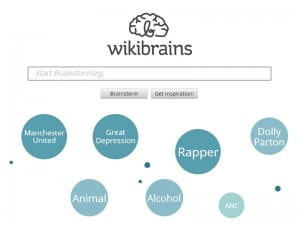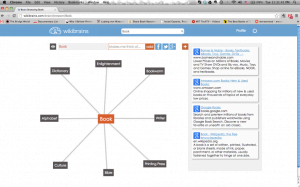Brainstorming is an everyday activity. We use it in professional and personal settings, whether it’s to make an important business decision or deciding which movie to see – on one level or another, we brainstorm daily. Four recent immigrants to Israel love to brainstorm so much that they have created WikiBrains – the world’s largest online brainstorm.
WikiBrains, launched just three months ago, is an community of users from around the world, mainly students, who use collective intelligence to help one another come up with new “outside the box” ideas on any one topic.
Related articles
- ‘I Stopped’ Facebook App Offers New Method To Kick Old Habits
- Computer Program As Effective As Drugs For Children With Anxiety
“Typically, brainstorming is a very boring, lonely task,” founder, Jishai Evers tells NoCamels. “The process is frustrating and you’re left with so many tabs open.” WikiBrains believes that the process of brainstorming should be an exciting and creative process. “Brainstorming is no longer an isolated experience,” team member Leon Markowitz tells NoCamels, “our generation is much more connected, it’s time we have a more collaborative brainstorm experience as well.”
Different ideas over time and space
Evers explains that Wikibrains allows for content and ideas to change with time and added demographics, so the dynamic constantly changes. The more users contribute, the larger this online “brain” will grow.
In order to become part of what they call the “knowledge revolution”, Wikibrains is also targeting college professors: “Once a solid student database is formed, certain words will begin to grow in popularity, sparking more and more brainstorming,” Evers tells NoCamels. And as college professors begin to introduce the website in class, students will be encouraged to try it on their own at home – and the storm will grow even further, Evers says.
Sign up for our free weekly newsletter
SubscribeWikiBrains could prove to be an advantage in the academic world. When someone is given an assignment on a topic they don’t know much about, for example the “Great Depression”, WikiBrains is a valuable resource. Type “Great Depression” into the Wikibrains search engine and up comes the Dust Bowl, and the stock market crash of 1929. By clicking on one of the brainstorm “bubbles”, “Dust Bowl” for example, you’ve created your first brainstorm! On the sidebar, you are then presented with testimonies, photographs, and YouTube videos of the Dust Bowl during the Great Depression.
WikiBrains is part of the field of Education Technology (EdTech) that is currently trending in the education world. Former Apple CEO, John Sculley commented on this switch to EdTech: “I think the real opportunity of education is not in the classroom, the learning begins when the student has the opportunity to be in control, the student can start to access learning on their own.” Education technology is growing quickly and companies in the sector believe it has the potential to change the institution of education.
Students and professors feeding off one-another
The founders’ “big picture” goal is that this database of brainstormers will grow so large and international that the collaboration of brainstorming will promote multi-cultural understanding. Markowitz explains to NoCamels how students from all over the world have different associations with the same words: “Someone from Minnesota has a different perception of Bob Dylan, a native Minnesotan, than someone from elsewhere in the world,” Markowitz elaborates. “That allows for a very complete brainstorm.”
Wikibrains is a place to share your interpretation, learn from others, and find news content, videos, and academic journals all in one place. The social aspect is allowing for both students and teachers to come together in a common marketplace to feed off one another’s knowledge and inspirations, the Wikibrain team explains.
Related posts

Editors’ & Readers’ Choice: 10 Favorite NoCamels Articles

Forward Facing: What Does The Future Hold For Israeli High-Tech?

Impact Innovation: Israeli Startups That Could Shape Our Future






Facebook comments